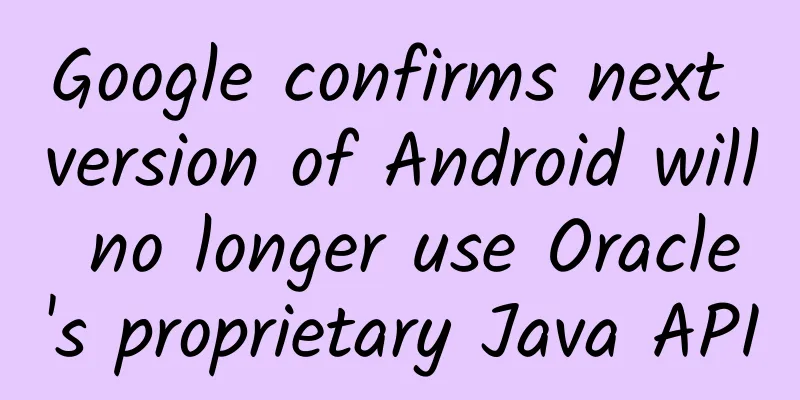Google confirms next version of Android will no longer use Oracle's proprietary Java API

|
Google is planning to switch Java application programming interfaces (APIs) from Oracle's proprietary Java Development Kit (JDK) to the open source OpenJDK. Hacker News first exposed the "mysterious Android code base" last month, and Google also confirmed to VentureBeat that "Android N" will only rely on OpenJDK, rather than Android's own version of the Java API.
A Google spokesperson told VentureBeat:
Android provides some Java API libraries to support application development in the Java programming language, which are mainly divided into two parts - APIs for the library, and deployment code developed by Google that enables the library to work. As for Java's current owner, Oracle, there are two implementations of these libraries - the proprietary JDK version, and the open source OpenJDK version. Google decided to "consolidate" its efforts on OpenJDK, which Android already uses in some places, which means the company will share its implementation code. Initial import of OpenJdk files. Create new libcore/ojluni directory with src/main/java and src/main/native subdirectories. Build ojluni into core-oj jar. Use openjdk classes from java.awt.font package. Copy all files from jdk/src/share/classes and jdk/src/solaris/classes directories in openjdk into libcore/ojluni/src/main/java. Copy following native files from openjdk to libcore/ojluni/src/main/native: [long list of files] The "code commit" mentioned above indicates that 8902 files have been changed, which clearly indicates that the OpenJDK code has been added to Android. Google hopes that developers will be happy with this change because it simplifies the code they use to build applications (common code for these Java API libraries instead of multiple code bases). |
<<: The Programming Story of Little Printf: Chapter 2
>>: 13 Wearable Technology Trends to Watch in 2016
Recommend
Why is software development so labor-intensive even though there are many people and little work to do?
This article is about a "strange phenomenon&...
An activity operation plan that can attract thousands of fans!
Article introduction: This article mainly introdu...
2022 Chengdu Tea Tasting Studio Contact Guide
Chengdu Tea Tasting Studio has its own appointmen...
I'm tired of waiting and found out that iOS 9.2 beta4 is the official version
After 3 weeks of waiting, we finally welcomed the...
Shifang SEO training: How to do SEO diagnosis? What are the methods to steadily increase website rankings?
First of all, everyone must understand that this ...
Tik Tok Promotion Skills | 7 Essential Tools for Playing Tik Tok!
Recently, when I was communicating with many frie...
The complete secrets of SEO promotion revealed, only here!
The road ahead is long and arduous, but I will co...
Making mobile development easier Mobile Developer Service Alliance (MDSA) is officially launched
1/ 51CTO's new product Mobile Developer Servi...
How to promote and operate Xiaohongshu? Xiaohongshu promotion tips!
Not long ago, the news about Xiaohongshu conducti...
Google Maps celebrates its 15th anniversary with a major update, a redesigned interface and new thoughtful features
[[314224]] Yesterday, on the 15th anniversary of ...
Taking Cloud Music as an example, how to acquire a large number of target users at low cost and high efficiency
How can we quickly acquire a large number of targ...
Why do 5G phones consume power faster than 4G phones?
The biggest difference between 5G mobile phones a...
Apple Pay is not mature: 80% of iPhone 6 users in the US do not use it
[[129069]] According to a survey of 1,000 iPhone ...
How to create content in the tourism industry? Check out these eight super exciting examples!
Leo Tolstoy once said, “All great literature can ...
Some tips for becoming a hardcore programmer
Becoming a core programmer or technical role mode...









